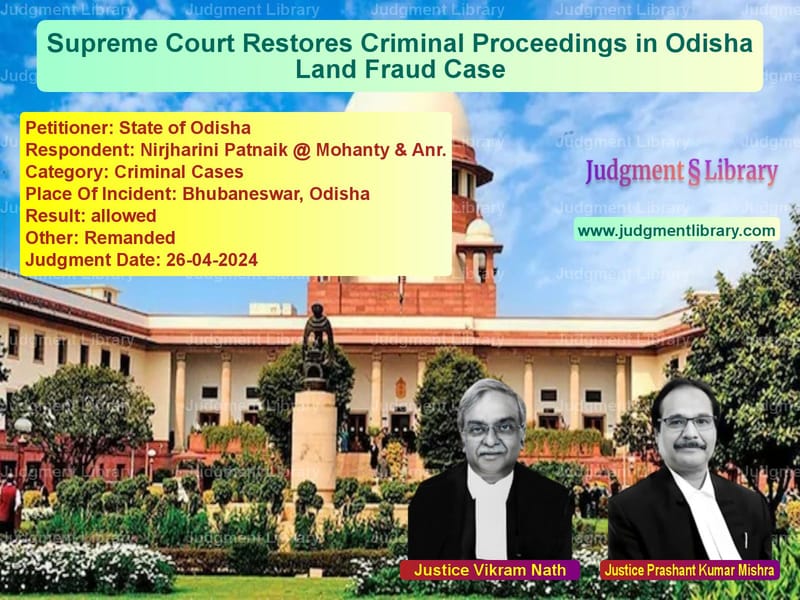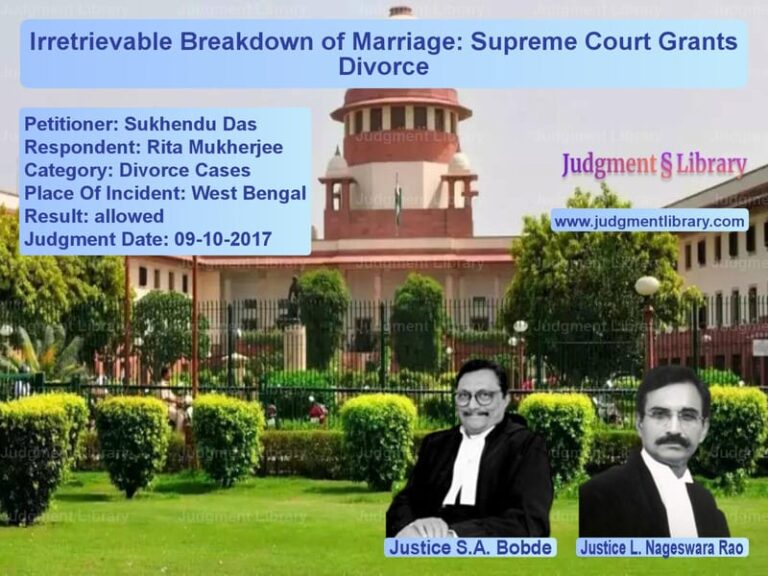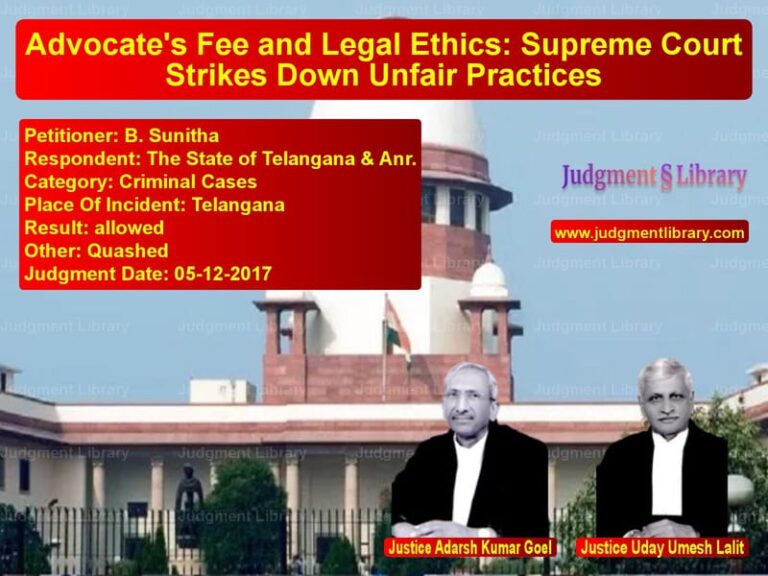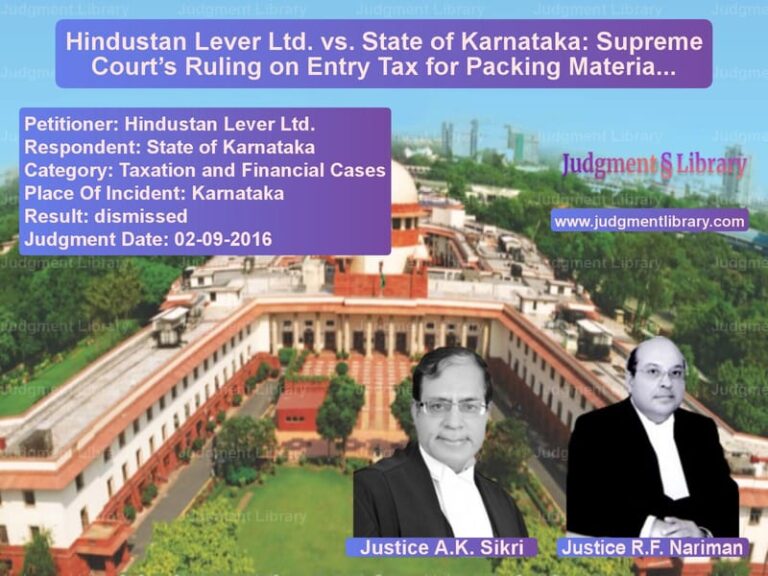Supreme Court Restores Criminal Proceedings in Odisha Land Fraud Case
The case of The State of Odisha vs. Nirjharini Patnaik @ Mohanty & Anr. is a significant judgment addressing a large-scale conspiracy involving government land fraud. The Supreme Court was called upon to determine whether the High Court had erred in quashing criminal proceedings against the accused despite compelling evidence of forgery and illegal land transfers.
Background of the Case
The dispute originates from an FIR registered on May 20, 2005 as Capital P.S. Case No. 178 of 2005. The complaint, lodged by the Special Secretary to the Government of Odisha, alleged that government land in Bhubaneswar had been fraudulently transferred to private entities using forged documents.
The chargesheet detailed a widespread criminal conspiracy in which fake revenue records, rent receipts, and court orders were used to manipulate land ownership. The accused included real estate developers, legal heirs of earlier lessees, and government officials.
Key allegations included:
- Forgery of land records using fake Hata Patas, Ekpadia, and rent receipts.
- Manipulation of judicial processes to validate false ownership claims.
- Illegal sale of prime government land in Bhubaneswar at grossly undervalued rates.
- Improper use of General Power of Attorney (GPA) to execute fraudulent transactions.
The SDJM, Bhubaneswar, took cognizance of the charges on September 26, 2015 under:
- Section 420 IPC (Cheating and dishonestly inducing delivery of property)
- Section 467 IPC (Forgery of valuable security, will, etc.)
- Section 468 IPC (Forgery for the purpose of cheating)
- Section 471 IPC (Using forged documents as genuine)
- Section 477A IPC (Falsification of accounts)
- Section 120B IPC (Criminal conspiracy)
- Section 34 IPC (Acts done by several persons in furtherance of a common intention)
The accused challenged this order before the Orissa High Court, which quashed the proceedings on January 17, 2018, citing a lack of direct evidence. The State of Odisha then appealed to the Supreme Court.
Read also: https://judgmentlibrary.com/supreme-court-cancels-bail-of-accused-in-uttar-pradesh-murder-case/
Arguments by the Appellant (State of Odisha)
- The High Court ignored key circumstantial evidence proving the accused’s involvement.
- The accused were real estate professionals and could not have been unaware of the fraudulent nature of the transactions.
- The illegal transfers caused substantial financial loss to the government.
- The quashing of proceedings prematurely halted a complex fraud investigation.
Arguments by the Respondents (Accused)
- There was no direct evidence linking them to the forgery.
- The transactions were executed legally, and any discrepancies were due to procedural lapses.
- The High Court rightly concluded that mere association with a disputed transaction does not prove criminal intent.
Supreme Court’s Analysis and Judgment
The Supreme Court found several errors in the High Court’s reasoning:
- Direct and circumstantial evidence established a prima facie case: “The accused were key players in the real estate sector and should have conducted due diligence before purchasing disputed properties.”
- Forgery of Power of Attorney: “The General Power of Attorney (GPA) used to execute these transactions was found to be altered and fraudulently registered.”
- Manipulation of revenue records: “False rent receipts and court orders were used to gain ownership of prime land, causing significant financial losses to the government.”
- High Court prematurely dismissed the case: “Such serious allegations require full trial proceedings, not quashing at the preliminary stage.”
The Court ruled:
“The High Court’s decision to quash the proceedings was erroneous. The allegations involve a complex conspiracy that must be examined in a trial.”
Supreme Court’s Final Order
- The appeal by the State of Odisha was allowed.
- The Orissa High Court’s judgment was set aside.
- The criminal proceedings against the accused were restored.
- The Trial Court was directed to expedite the case.
Legal Implications of the Judgment
- Quashing of criminal cases must be done with caution, especially in fraud and conspiracy cases.
- Forgery and manipulation of government records must be thoroughly investigated.
- Judicial processes cannot be misused to validate illegal land ownership.
- Real estate transactions require due diligence to prevent fraud.
Conclusion
The Supreme Court’s ruling reinforces the importance of due process in cases of large-scale land fraud. By restoring criminal proceedings, the Court ensured that allegations of government land manipulation would be thoroughly examined, protecting public assets from fraudulent encroachments.
Petitioner Name: State of Odisha.Respondent Name: Nirjharini Patnaik @ Mohanty & Anr..Judgment By: Justice Vikram Nath, Justice Prashant Kumar Mishra.Place Of Incident: Bhubaneswar, Odisha.Judgment Date: 26-04-2024.
Don’t miss out on the full details! Download the complete judgment in PDF format below and gain valuable insights instantly!
Download Judgment: state-of-odisha-vs-nirjharini-patnaik-@-supreme-court-of-india-judgment-dated-26-04-2024.pdf
Directly Download Judgment: Directly download this Judgment
See all petitions in Fraud and Forgery
See all petitions in Bail and Anticipatory Bail
See all petitions in Criminal Conspiracy
See all petitions in Judgment by Vikram Nath
See all petitions in Judgment by Prashant Kumar Mishra
See all petitions in allowed
See all petitions in Remanded
See all petitions in supreme court of India judgments April 2024
See all petitions in 2024 judgments
See all posts in Criminal Cases Category
See all allowed petitions in Criminal Cases Category
See all Dismissed petitions in Criminal Cases Category
See all partially allowed petitions in Criminal Cases Category







